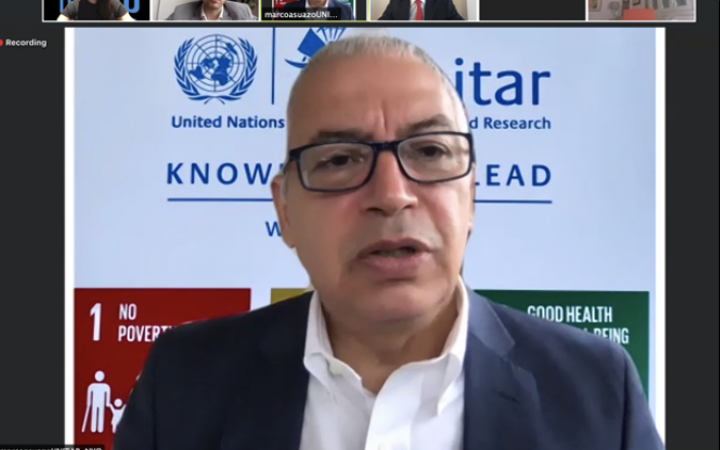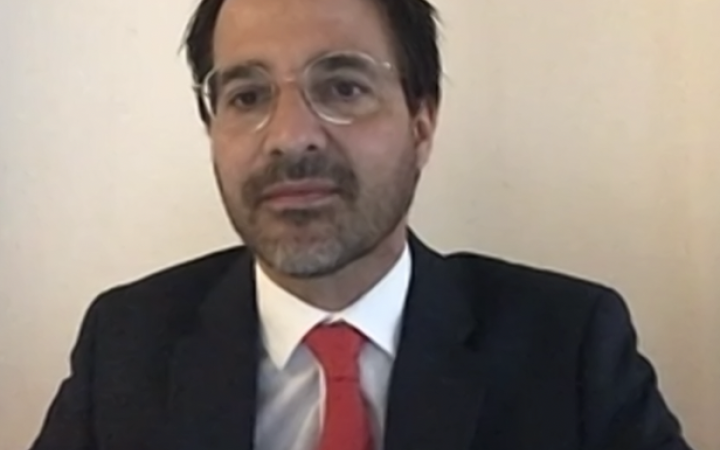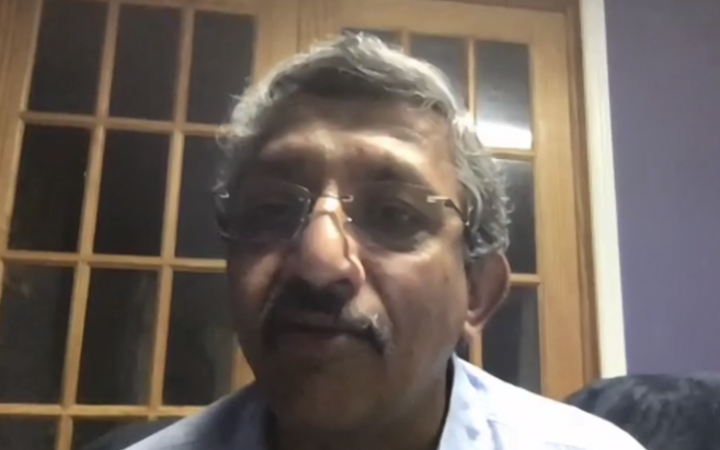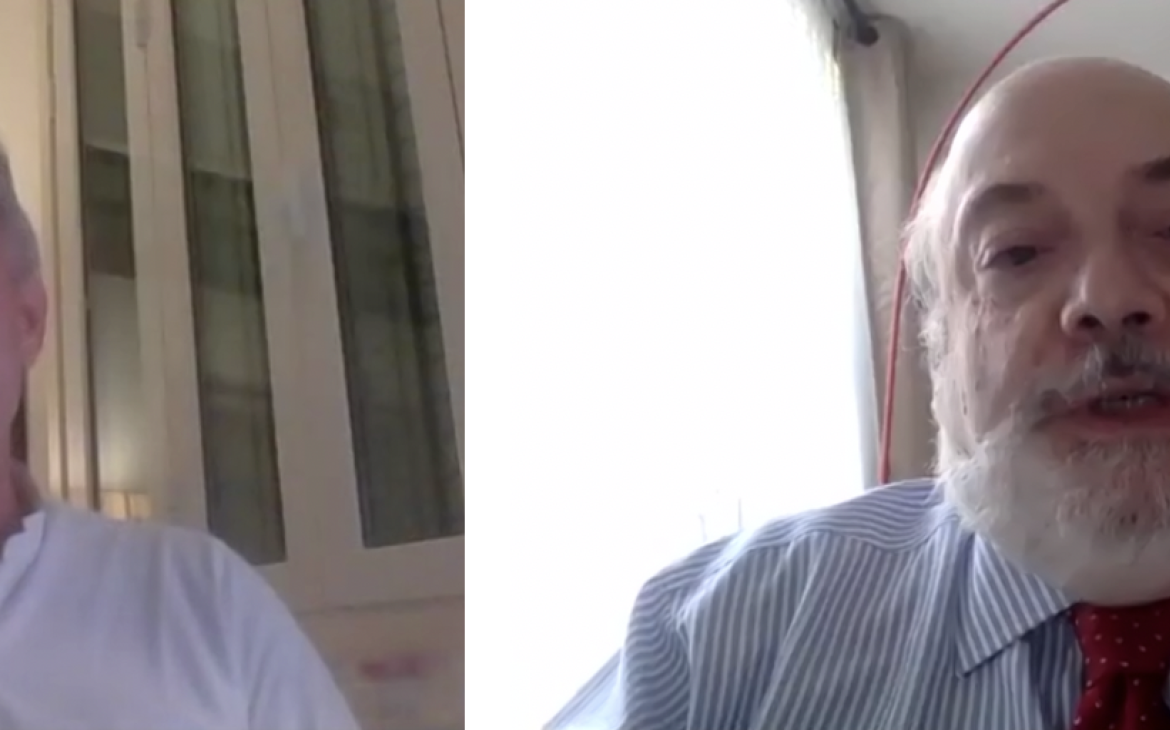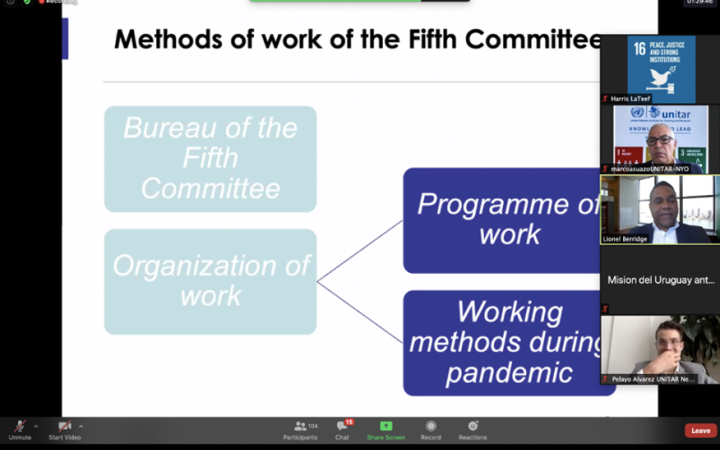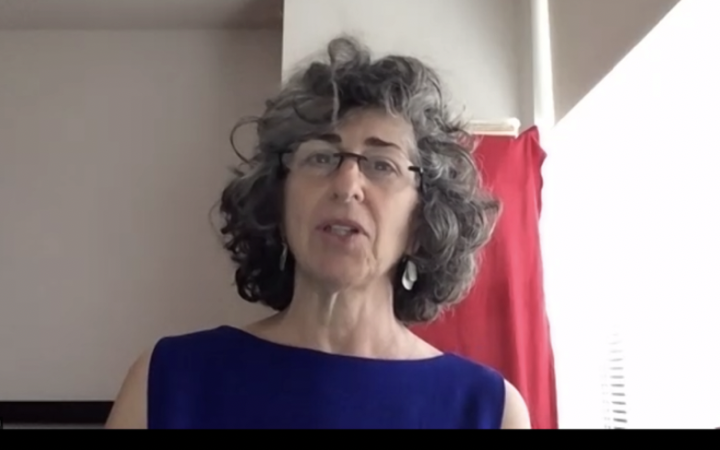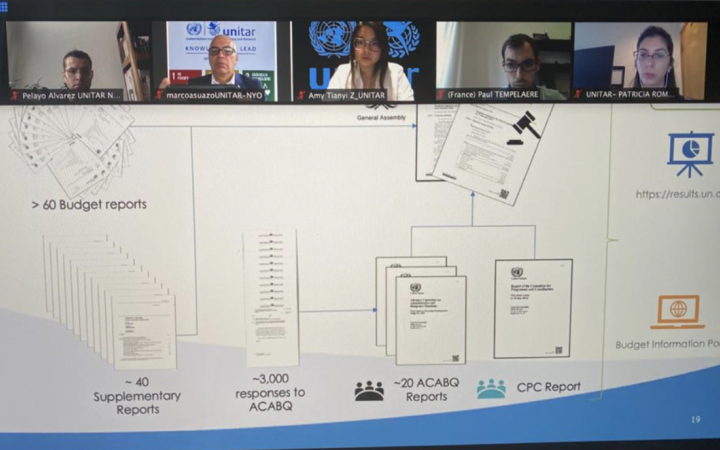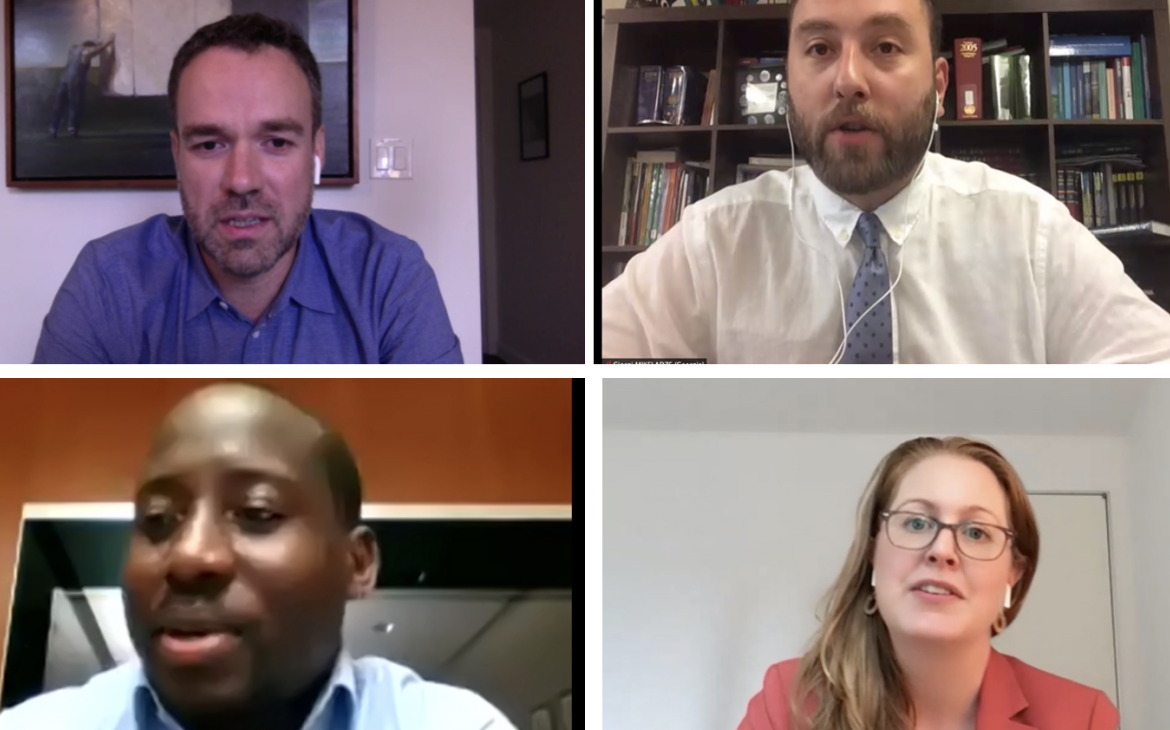1- 2 September, New York USA, virtual seminar – The United Nations Institute for Training and Research (UNITAR) Office in New York successfully launched the Joint Swiss-UNITAR Briefing on United Nations Budgetary Matters training series on Tuesday, 1 September 2020. The four-day virtual training programmecaters for the needs of the incoming delegates of the United Nations General Assembly Fifth Committee. The first two sessions have directly benefited more than 120 delegates each session from numerous Member States.
The first day of the training kicked off at 9:00 am (EST). Serving as an introductory course, the session covered topics such as responsibilities, and the key players of the Fifth Committee. Mr. Marco Suazo, Head of UNITAR Office in New York office delivered his welcoming remarks in the beginning of the session. He encouraged delegates to take advantage of this training series as a great resource to prepare them for their work in the Fifth Committee.
Mr. Dominique Favre, Deputy Permanent Representative of Switzerland to the United Nations continued with his welcome remark. Mr. Favre expressed his gratitude for the participants’ time and UNITAR’s effort in organizing this event. He mentioned that during this unprecedented time, it was crucial to pay attention to the people who were working behind the budgetary procedure, and most importantly, the experience of those who were involved in the decision-making process.
Mr. Suazo then welcomed the keynote speaker, Mr. Chandramouli Ramanath, Controller, Assistant Secretary-General for the Programme Planning, Finance and Budget in the Department of Management Strategy, Policy and Compliance (DMSPC). As a longstanding staff of the department, he recognized the Fifth Committee as one of the most important and complicated committees for the delegates to assume duties. The significant responsibilities and the workload signified the importance of efficiency. Mr. Ramanath believed that the industrious work ethic of the Fifth Committee delegates have successfully pushed the organization forward.
He then provided a brief analysis on the financial situation of the UN. As the Covid pandemic confounded the ongoing ‘financial pandemic’, the future of the UN requires collegial support from the Member States. The UN has weathered a wave of financial maelstrom, he believed that as long as different factors work collaboratively in an efficient manner, there would be a solution to stimulate the working achievements of the Committee. The first presentation ended with Mr. Ramanath answering questions from delegates on fiscal calendar and the mechanism of the effectively arrangement of unspent funds.
The outgoing Chair, H.E. Mr. Andreas D. Mavroyiannis, the Permanent Representative of Cyprus to the United Nations and the incoming Chair, H.E. Mr. Carlos Amorin, the Permanent Representative of Uruguay to the United Nations both presented a brief statement summarizing their experience, vis-à-vis expectation for the Fifth Committee. Despite its achievements, the Fifth Committee is still facing a lot of challenges from social, political and cultural aspects. Reaching an agreement between key players is quintessential to a healthy future of the UN.
Mr. Lionelito Berridge from the Secretary Administrative and Budgetary Committee continued the session with his presentation on the key players of the UN Budget. He broke down his session into three parts: overview, work programme and the work methods of the Fifth Committee, especially during the pandemic crisis. The session covered the legislative basis, the structure of committee, and the appointments and the elections that are affiliated to the Committee. According to Mr. Berridge, the Fifth Committee has been actively adapting to the new norm since the crisis, and has successfully elevated its working methods to better respond to the situation.
The last session was presented by Ms. Shari Klugman, the Executive Secretary of the Advisory Committee on Administrative and Budgetary Questions (ACABQ). She explained the supportive role of ACABQ in the Fifth Committee’s decision-making process. As a UN finance “watch guard”, the ACABQ used numbers to analyze if the funds from the Member States were spent efficiently and reasonably. She pointed out that different from other departments, ACABQ was very mindful of the political climate and the environment of working in the UN. Its final products would be directly relevant to the delegates in the Fifth Committee.
Upon the conclusion of the first day’s session, the delegates would have a greater idea of the Fifth Committee and its impact in the UN system.
The second day of the training continued at 9:00 am (EST) September 2nd with more detailed illustration and specific discussions regarding the UN Budget Process. After Mr. Suazo’s welcomed the participants, he introduced the first speaker Mr. Johannes Huisman, Director of the Office of Programme Planning, Finance and Budget for the Department of Management Strategy, Policy and Compliance (DMSPC) to the session.
Mr. Huisman combined his professional experience with the new situation, and provided a detailed analysis on different aspects attached to the UN Budget Process. His presentation covered a myriad of fundamental topics such as the legislative framework, financial regulations and rules, the breakdown of budgetary cycle, sequencing and budget plan, terminology, monitoring and reporting, to name a few. Mr. Huisman’s logical and pellucid speech not only helped delegates understand the operational mechanism of the Committee better, he also provided helpful recommendations when it comes to terminology and drafting resolutions and reports.
After a brief Q&A session with delegates discussing questions regarding the drafting of the Financial Performance Report and budget recommendations, the session moved on to the second speaker, Ms. Unis Valencia Williams-Baker, the Chief of Service of the Deputy Director for Budgets of Development Pillar and Human Rights, Department of Management Strategy, Policy and Compliance (DMSPC).
Her presentation focused on the resolution process (drafting exercise), rules and procedure and drafting budgetary resolutions exercise for the Fifth Committee as a whole. Ms. Williams-Baker started her presentation with a detailed illustration on the substances of a resolution, and then she moved on to explain the legislative framework, evolution of a resolution document, the process related to resolutions, and last but not least, the structure and the writing tips when it comes to writing a resolution. In this practical session, she presented various real-life examples for the delegates to better understand the differences between terminologies and the usage of languages. The delegates were able to gain an overview of the procedures and acquire writing tips and methods.
The second day ended with an innovative “Ted Talk” session moderated by Ms. Melina Savva from the Permanent Mission of Cyprus. To help new delegate have a more precise recognition on what was it like working in the Fifth Committee, Ms. Savva invited four of her colleagues: Mr. Giorgi Mikeladze, the Vice-Chair of Fifth Committee of the 74th Session and the Legal Adviser/Counsellor for the Permanent Mission of Georgia to the UN; Mr. Thiago Poggio Padua the Vice-Chair of the Bureau of the Fifth Committee of the 74th Session, Counsellor from the Permanent Mission of Brazil to the UN; Mr. Katlego Mmalane, the First Secretary from the Permanent Mission of Botswana to the UN; and Ms. Jillian Rees, First Secretary of the Permanent Mission of Australia to the UN.
Four participants each shared their best and “worst” experience while working at the Fifth Committee. The interactive aspect of the question lightened up the environment and the delegates opened up about the works and the challenges they faced while working for the Fifth Committee. According Mr. Giorgi Mikeladze, the working procedure of the Fifth Committee could be incredibly intense, and it was drastically different from other committees. Although it might be difficult at first for the new delegates to adjust and to understand the situation, it was a worthy experience. He also referred to the UNITAR’S Joint Swiss-UNITAR Briefing on United Nations Budgetary Matters as a “life-saving” session for the new delegates as it equipped new delegates with necessary knowledge to tackle the workload of the Fifth Committee.
Mr. Katlego Mmalane believed that the existence and the wellbeing of the Fifth Committee is integral for the entire UN, as numerous projects and programmes are “relying” on the work of the Fifth Committee. Echoing what Mr. Mmalane has said, Ms. Jillian Rees and Mr. Thiago Poggio Paudua also believed that the Fifth Committee is the best place for delegates to understand the mechanism, and the world of the United Nations.
Ms. Savva then moved on to ask four participants more questions on the new changes that will take place for the 75th session and on the adjustment to the current situation. Four speakers shared their tips on coping with the virtual environment, and explained the potential changes and the reasons behind based on their experience.
This new format has offered participants a closer look on their future work in the Fifth Committee and provided them with helpful resources to face some potential obstacles. Upon the conclusion of the second day of training, the participants managed to interact with “old hands” about their experience, and had an intimate dialogue with bureau members. The training will resume its 3rd session on Thursday at 10 a.m. EST


